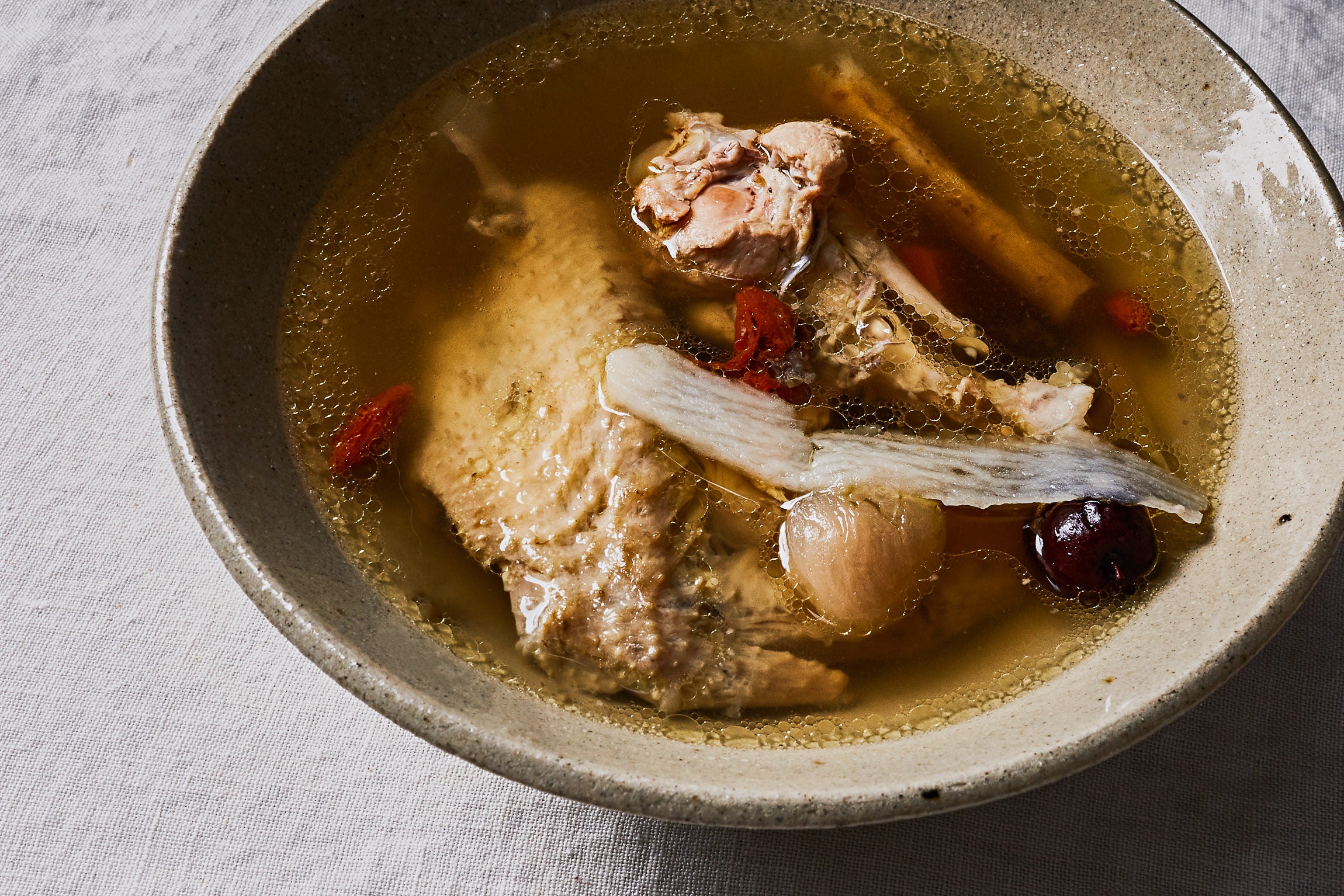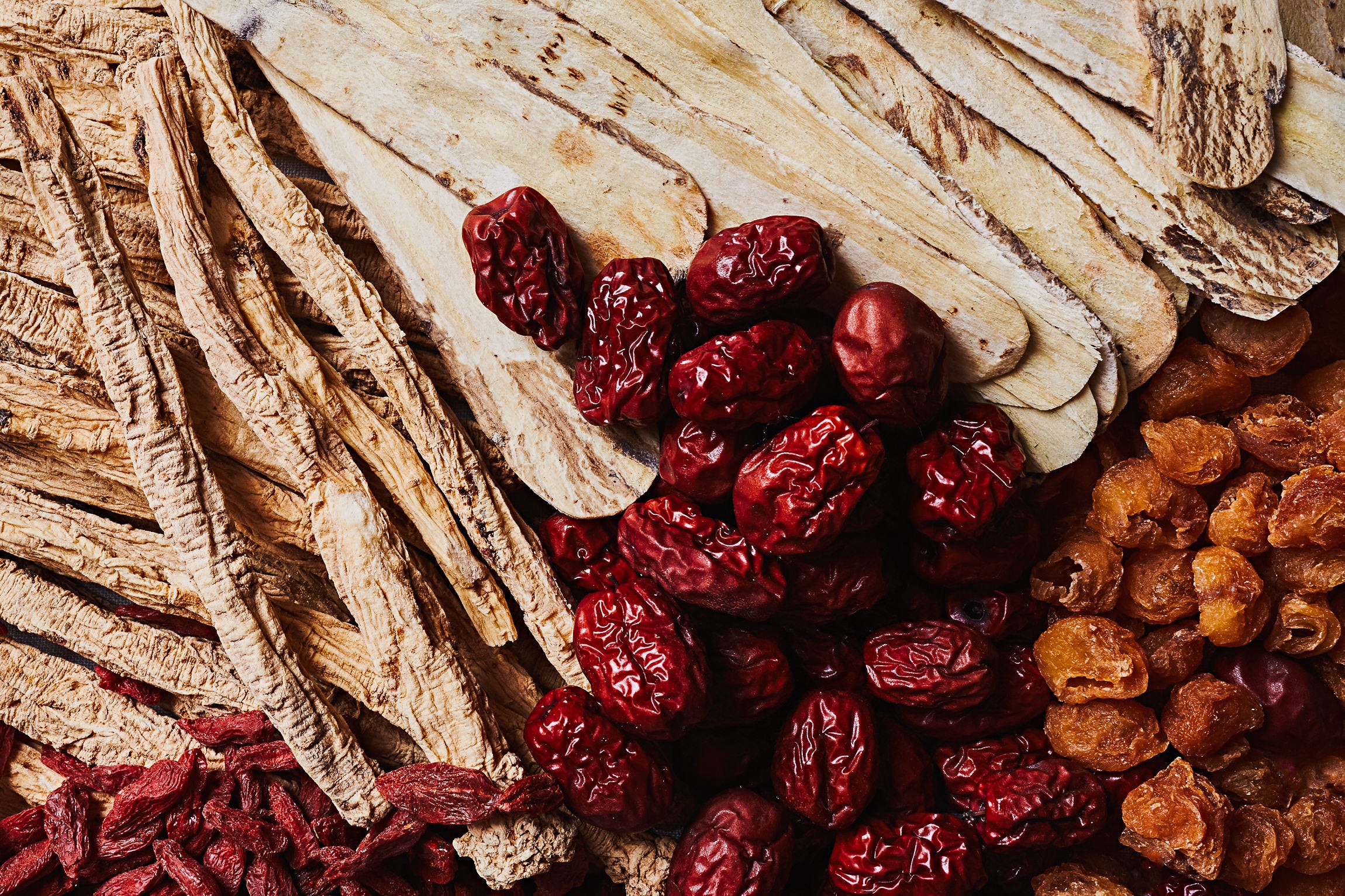Have a cold? Giving birth? Feeling stressed at work? A chicken and a packet of dried herbs is all you need.
In grade school, you learn that one plus one equals two and the sky is blue because molecules in the air scatter more blue light than red light from the sun. You learn how to cooperate with others and clean up your own messes, and you learn that chicken noodle soup is what your mom makes you when you’re sick. So on a cold day in seventh grade, when I felt just a little under the weather, I thought I was only following protocol when I asked my mom for some chicken soup.
What I expected and what I got were from two worlds—two cultures, really. The American one I grew up in and the Chinese one my mother grew up in. Instead of the Campbell’s soup version I was expecting from all of the commercials and advertisements, I got a bowl full of chicken parts and floating bits of dried fruit and other roots and plants—not a noodle in sight. The soup was sweet from carrots, dried longan (a tropical fruit with a hard shell and fleshy meat similar to lychee), and goji berries, which balanced the bitterness of the dried herbs. The chicken gave it a salty richness (and made it filling).
This soup doesn’t exactly have a name. While famous Chinese dishes all have pretty universal names (if you order egg rolls, for example, you won’t be too surprised by what lands on your table), home-cooked dishes come with more descriptors than names. I used to call it “chicken soup with dried stuff in it,” but that’s disingenuous. I’ve started calling it simply “Chinese chicken herbal soup.” A quick Google search shows that that’s probably right, but it doesn’t really roll off the tongue. Whatever the names we call it, the powers the soup contained staved off my impending cold.

I won’t go into a full history of Chinese medicine, but for as long as I can remember our family abided by a mashup of Eastern and Western methods of staying healthy. Any time my brother and I had a sore throat, our parents would make us take cherry-flavored Robitussin and, to help speed up the healing process, warn us not to eat anything “hot”—not in reference to a food’s actual temperature, but rather to the effects they have on a body that is already hot from illness. Even to this day, my colleagues know I drink my water warm to maintain the delicate balance of the body. I should have known that a chicken soup my mom would prepare would also be one to physically—if not just spiritually—restore.
In Chinese cooking, every ingredient has a purpose, so of course when it comes to an herbal soup, so does each root: Astragalus root to strengthen the inner energy and protect your immune system—especially if a body is under stress from work. Codonopsis root to help with everything from a tired body to stress to digestive problems. Goji berries to improve eyesight—especially from staring at computer screens for too long (do you sense a pattern here? Perhaps work is…not good?). Longan to promote restful sleep, slow down aging, and replenish qi, a traditional Chinese idea of the energy that flows through a person’s body. Ginger for body aches, stomach issues, and anti-aging. And red dates, a vitamin-packed fruit containing vitamins B, C, E, calcium, iron, and potassium, to protect your liver and central nervous system.

With the Goop-ification of herbal remedies, explaining what each herb does may sound woo-woo. Until I had to start fending for myself in college and my health was truly in my own hands, I used to roll my eyes anytime my mom would force me to drink an herbal concoction to cure an ailment. I was American, I told my mom, and I believed in Western medicine because it’s been tested by companies I trusted. My mom wouldn’t let me off the hook, so she took me to a Chinese herbal shop in Monterrey Park, a very Chinese suburb in San Gabriel Valley, to meet an herbalist. The shop was cramped, and it smelled like ginseng. From floor to ceiling were tiny shelves, each with handwritten labels as well as large, clear jars stacked on these wooden shelves, also with handwritten labels. The herbalist was a wizened woman who sat me down on a plastic neon-colored stool, looked at me, my tongue, my hands, and put her hand on my neck to check my temperature.
“Your eyes are going to get bad soon,” she said to my mom in Mandarin, which my mom relayed to me in Cantonese. At the time, I was the only one in my immediate family and the only one in my dad’s extended family not wearing glasses. I watched her open these tiny shelves, pop open jars, measure everything, and explain to my mom how to boil everything to make a tea. I have glasses now, but I still don’t really need them. I think the tea may have worked.
When I had surgery five years ago, I lived in New York, 3,000 miles away from any family, and my mom was in another country and legally couldn’t visit me. What do you do when you want to make sure your daughter has the comforts of home, of love, without physically being there? You do what every Chinese mom does and mail her the dry ingredients to make Chinese chicken herbal soup. When my mom posted about my recovery on Facebook, an influx of FedEx boxes began arriving at my apartment from various aunties, holding ziplock bags of the same dried herbs. None of them had told my mom or consulted with each other, but they just knew that this was the ticket.
I asked my cousins if this is what they drank, too. They all said yes, and yes, they had seen it cure everything from the cold to the flu to a sore throat. Recovering from surgery? Or childbirth? No matter how great or small the ailment, this was the cure.